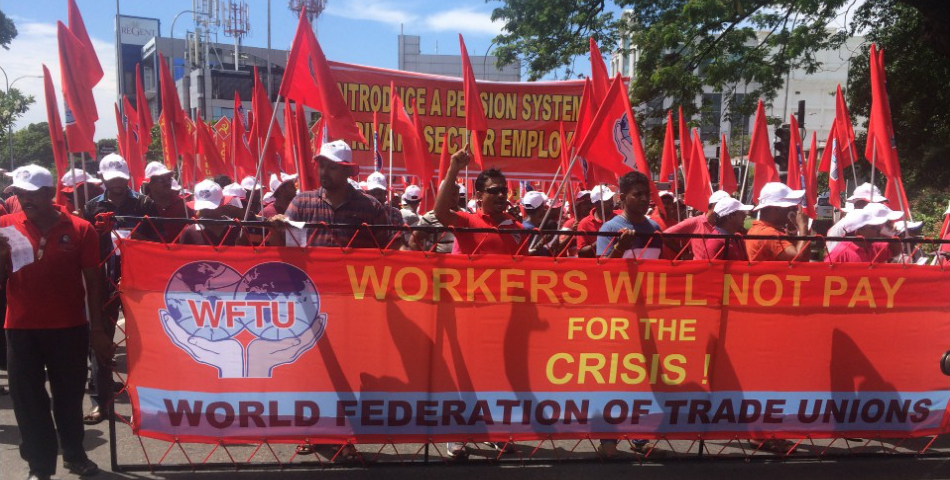PV Labour Bureau
As 2022 drew to a close, working people around the world received end-of-year messages from the two main international trade union federations, the World Federation of Trade Unions (WFTU) and the International Trade Union Confederation (ITUC). The content of the messages was wildly different from one another, revealing the starkly contrasting approaches to union leadership at the global level.
The class struggle-oriented WFTU spoke of 2022 as a year of important struggles for the international working class and placed those struggles in the context of “sharpening imperialist competition to control global resources and markets.” The union central, which was founded in 1949, referenced many imperialist aggressions including wars and sanctions, and specifically pointed to the war in Ukraine as an especially dangerous development which “undermines the inalienable right of the peoples to live in peace, triggering at the same time serious repercussions and affecting the working-class living conditions globally.”
The WFTU noted that this increasing militarism and aggressiveness is a symptom of a new capitalist crisis which monopoly capital expects working people to pay for – through higher prices, wage cuts, reduced pensions. The task of the labour movement is to oppose this assault, on behalf of all working people.
“During the last months, it was the struggles and mobilizations of trade unions that stood in the way of anti-people policies that wanted workers voiceless, and submissive. On uncounted occasions, thousands of workers took to the streets giving strength and optimism to all to break that climate of fear, intimidation, and repression. Fighting for free and inclusive healthcare for all, respect and implementation of the democratic and trade union freedoms, an immediate increase of wages and pensions, protection of workers’ purchasing power and living standards, and for the satisfaction of the people’s interests.”
Against this rousing and fighting message, the year-end remarks from the ITUC were a limp plea for mercy. It didn’t mark workers’ and union struggles around the world, or provide a class-based analysis of the changing economic and political conditions, or commit to leading the fight for improved working and living conditions. Instead, it announced the suspension of its newly elected General Secretary Luca Visentini, who had been arrested in Belgium in early December on charges that he had taken bribe money from Qater in exchange for lobbying European Union political and economic officials, an independent external audit of the union central’s finances, and the establishment of a special commission to investigate the circumstances surrounding the allegations of corruption.
The illegal actions of individual leaders shouldn’t necessarily tarnish an entire organization. But in the case of the ITUC, it had spent much of 2022 (before Visentini’s election as General Secretary) publishing and promoting statements which were “slanted” in favour of the Qatari government, largely in relation to the FIFA World Cup. So, while many labour organizations, including the WFTU and the All Pakistan Federation of United Trade Unions, issued condemnations of the deaths of thousands of migrant workers who were building the World Cup facilities, as well as the state’s oppression of the basic rights of women and LGBTIQ+ people, the ITUC loudly proclaimed that “Qatar’s labour laws set the foundation for a World Cup with workers’ rights.”
It is difficult to imagine how a union could celebrate the “workers’ rights” of a World Cup whose preparations cost the lives of thousands of workers. That the head of the organization is linked to a bribery and corruption scandal, whose purpose appears to be explicitly to cover up anti-labour crimes, is simply the icing on a wholly rotten cake.
Notably, the ITUC was founded in 1949 as the International Confederation of Free Trade Unions (ICFTU), to specifically oppose the WFTU and its class struggle orientation. Many of the unions which left the WFTU to form the ICTFU cited as their reason the WFTU’s support for socialist countries.
Here again, it is difficult to imagine how a union body could so fundamentally oppose a social system based on working-class rule, that it would instead ideologically assail its membership with the “virtues” of imperialism. Part of the answer lies in the memoir of former CIA agent Philip Agee, who wrote in 1975 that the ICFTU was “set up and controlled by the CIA to oppose the World Federation of Trade Unions.”
So, the ITUC enters 2023 desperately trying to distance itself from individual leaders, while maintaining its overall strategy of collaborating with the bosses and the capitalist state. This is a “business union” leadership approach which breeds disillusionment and disengagement among workers. It fosters the view that all leadership is self-serving and even corrupt, and that it is not possible to build a mass struggle for radical and fundamental change.
The WFTU, on the other hand, has identified a set of priorities for the new year which will expand and strengthen the global class struggle. These include:
- Continuing to organize workers into the class struggle-oriented trade union movement
- Coordinating labour actions and struggles throughout the world and providing information and tools to make those struggles better prepared and more effective
- Deepening its interventions in international organizations such as the International Labour Organization, to represent working-class demands and interests more forcefully
- To build the struggle against all forms of discrimination, particularly with respect to working women and young workers
- To fight for a safe and healthy working environment for all workers, including sustainable human development and climate justice.
This is a class struggle approach to leadership which comprehends, supports and engages working people in all their struggles, whether in the workplace or the community or internationally. Instead of represent the interests of monopolies to workers, it helps workers to understand that capitalist exploitation is the basis for their hardships, for the widening gap between the rich and the poor, for environmental destruction and the climate crisis, for militarism and war. And it is a leadership approach which organizes and mobilizes workers to defend their interests and win fundamental change.
The labour movement in Canada – including the Canadian Labour Congress and the Quebec labour federations – are members of the ITUC. Their members do not currently have the benefit of the WFTU’s class struggle leadership. But workers in Canada can learn from their comrades in the WFTU and, combining those lessons with their own experience, organize to strengthen the labour movement here. A key starting point would be agitating for unions in Canada to demand Visentini’s dismissal, and to actively oppose imperialist organizations like NATO and the National Endowment for Democracy (and its labour partner, the “Solidarity Centre”).
More fundamentally, workers in Canada need to democratize their union bodies, build international working-class solidarity, pursue class struggle social union policies, and orient around a radical, independent political program for labour. In the process, they can build a trade movement with strong grassroots and a fighting class struggle leadership.
Get People’s Voice delivered to your door or inbox!
If you found this article useful, please consider subscribing to People’s Voice.
We are 100% reader-supported, with no corporate or government funding.




